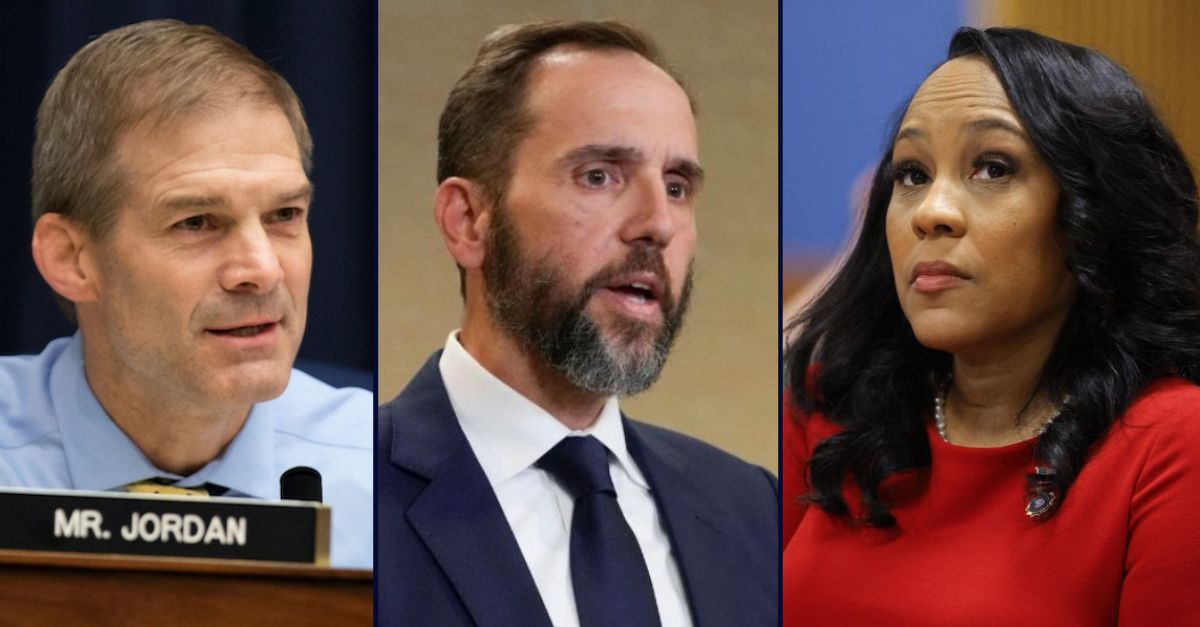
On the left side, we see a picture of Rep. Jim Jordan from Ohio questioning Deputy Assistant FBI Director Peter Strzok in Washington, DC, on July 12, 2018, as captured by Alex Edelman/Getty Images. In the center, Jack Smith is shown talking about the indictment of former President Donald Trump on August 1, 2023, in an image credited to AP Photo/Jacquelyn Martin, File. To the right, Fani Willis is depicted arriving for a hearing concerning the Georgia election interference case on Friday, March 1, 2024, in Atlanta, as documented by AP Photo/Alex Slitz, Pool.
Fulton County District Attorney Fani Willis on Thursday nixed a request by congressional investigators for documents related to her office’s correspondence with special counsel Jack Smith.
The denial is the latest indication the Peach State prosecutor intends to move forward with her racketeering (RICO) prosecution of President-elect Donald Trump. In fact, in a letter to House Judiciary Committee Chair Rep. Jim Jordan, Willis says she is still committed to the long-stalled effort targeting the 45th and 47th president.
Earlier this month, in a letter dated Dec. 4, the Ohio Republican gave the Georgia Democrat a tight deadline of Dec. 9, to turn over documents related to her and her office’s discussions with various federal authorities about criminal investigations into Trump.
That deadline has now, of course, whooshed right on by. And Willis, for her part, does not seem too concerned about missing the cutoff.
“In that letter, you once again request information related to an ongoing prosecution for violations of Georgia law,” the prosecutor’s response reads. “After consultation with legal counsel, I wish to once again state my position, which has remained unchanged after a year of thoughtful correspondence between our offices. I cannot disclose documents that would compromise an ongoing investigation and prosecution by my office. Therefore, I cannot produce the documents requested by the House Judiciary Committee.”
The reference to the parties’ “thoughtful correspondence” in Willis’ response to Jordan is a euphemistic turn of phrase. The denial letter is actually the latest volley in a decidedly combative correspondence between the elected officials that began well over a year ago.
In August 2023, the Judiciary Committee began its oversight crusade by asking Willis for files related to her office’s “receipt and use of federal grant funds issued by the U.S. Department of Justice.”
Two additional letters asking for substantially the same materials followed in September and December of last year.
In response, Willis declined them all.
By January, the district attorney’s fortunes began a long slide to bad as several co-defendants in the RICO and election subversion case against Trump sidelined the prosecution. This disruption — still ongoing — was made possible by Willis’ romantic relationship with since-cut loose, then-lead prosecutor Nathan Wade.
Willis — and Wade while he was still on the case — replied to Jordan’s requests on numerous occasions by decrying any notion of wrongdoing and categorizing the underlying allegations as little more than a political witch hunt intended to hamstring her prosecution.
In the end, Jordan’s efforts bore little fruit even as the RICO case came under fire due to a combination of Willis’ personnel choices and her public defense of those choices in a speech at a historically Black church that cast her — and Wade’s — detractors as racists.
Still, the committee kept pushing for the documents.
In February, Jordan issued a subpoena for documents relevant to allegations the district attorney’s office “has misused federal funding.”
At the same time, the district attorney’s office began responding to the subpoena by producing around three dozen documents. Additionally, Willis said her office would continue producing any such relevant documents to the committee on a rolling basis.
In March, Jordan sent Willis another letter, alleging the district attorney’s office had “failed to produce” responsive documents in response to five broad categories of requests.
Willis fired back in late March — telling Jordan: “[N]othing that you do will derail the efforts of my staff and I to bring the election interference prosecution to trial so that a jury of Fulton County citizens can determine the guilt or innocence of the defendant.”
For a while, there was radio silence between the pair.
Recent events prompted Jordan to reach out again — seemingly convinced about the strength of his hand.
On Dec. 2, a court in Georgia found Willis in violation of Peach State open records laws for a violation that occurred within the context of a lawsuit aimed at prying away information about her and her office’s communications with Smith and members of the since-defunct House select committee investigating the Jan. 6 attack.
In a 6-page order granting the plaintiff’s motion for default judgment, Fulton County Superior Court Judge Robert McBurney ordered the district attorney’s office to provide the requested documents and left open the possibility of forcing the state to pay attorneys fees.
In the underlying lawsuit, conservative government watchdog group Judicial Watch accused Willis, and Fulton County broadly, of making “likely false” representations about the retention of such documents.
Jordan’s last letter to Willis framed the court’s order in the Judicial Watch case as instructive for how the district attorney might find or conduct herself with regard to his similar requests.
Now, that hope appears a bit dashed.
“As I have previously written to you, the communications you are seeking — to the extent they exist — directly relate to Fulton County’s ongoing investigation of several individuals pursuant to Georgia criminal statutes,” Willis goes on. “These individuals were property investigated and indicted by a grand jury consistent with Georgia criminal procedure Prosecution of these charges is ongoing.”
The embattled prosecutor also takes a shot at the representative’s authority to even make such demands for such documents.
“More fundamentally, your request exceeds the limits of congressional authority and violates constitutional principles of separation of powers, state sovereignty, and federalism” the Willis response to Jordan continues. “At bottom, you seek documents revealing how attorneys in my office conducted an investigation that ultimately led to a grand jury indictment. Any such documents are protected from discovery by attorney-client privilege, work product privilege, and other common law protections.”















